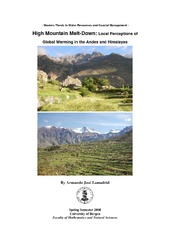High Mountain Melt-Down: Local Perceptions of Global Warming in the Andes and Himalayas
Master thesis
Permanent lenke
https://hdl.handle.net/1956/5089Utgivelsesdato
2008Metadata
Vis full innførselSamlinger
- Department of Earth Science [1050]
Sammendrag
Present scientific knowledge about global warming affirms that ice and snow packs in the high mountains of the world are melting at increasing rates (see IPCC 2007 and UNEP 2007). Melting glaciers and receding snowlines jeopardize seasonal stream and river systems in arid regions of the world and threaten the livelihood of farmers who utilize the meltwater for irrigation. This study contrasts two case studies in the Himalayas of Nepal and the Central Andes of Perú to gauge the impacts of these changes. The perceptions of these agriculturalists are the central focus of the analysis, first to determine the extent and trajectory of changes in the local cryo-hydrological regime, second, to discover the local meanings of such changes, and third, to compare the distinct cultural discourses that emerge from similar geo-physical situations. Villagers from Lumbuk Canyon, in Mustang, Nepal and from the Colca Valley in southern Perú have perceived definite changes in local climatic patterns and a noticeable decrease in mountain snow and ice. The effects of the changes are myriad and colored by local cultural interpretations and myths, as well as by external', modern' knowledge. The discourses on the meaning of and necessary responses to cryo-hydrological changes reveal a competition and at times a conflation of local and modern' ways of seeing. It is important that the discourse of modern development not overwhelm and eclipse local perceptions of this global problem. Only by recovering these narratives can we fully understand the impacts or hope for possible local solutions rooted in traditional knowledge.
